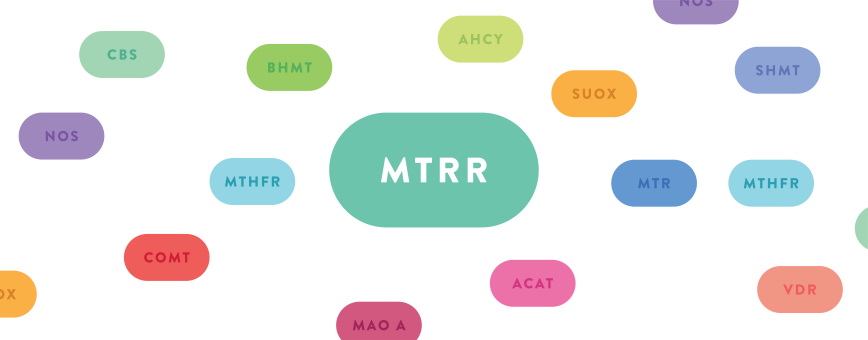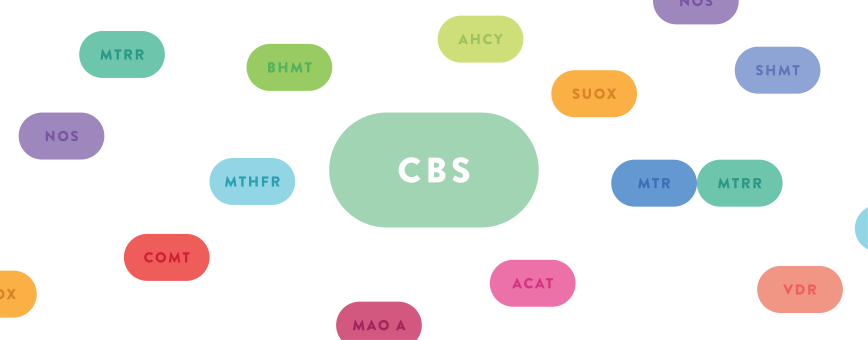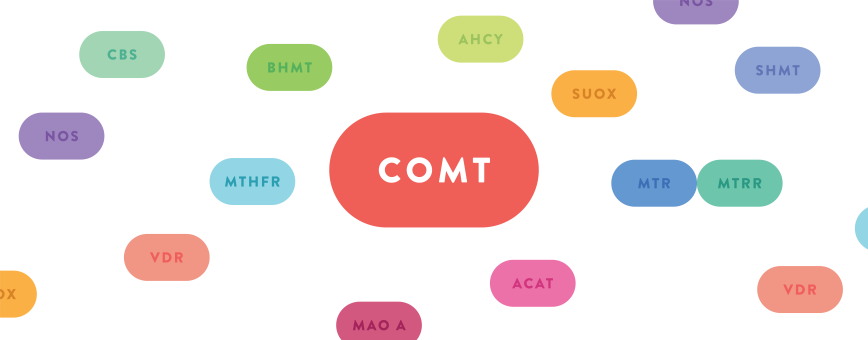The AHCY gene gives your body instructions on how to make the enzyme S-adenosylhomocysteine hydrolase. This enzyme is involved in a multistep process that breaks down methionine into adenosine and homocysteine via S-adenosylhomocysteine (SAH).2,3
SAH is a very potent inhibitor of S-adenosyl-L-methionine (SAMe), which is the most important methyl donor in the body. AHCY sits downstream from SAMe; the activity of AHCY can therefore indirectly impact SAMe levels (via SAH) and as a result impact methylation.4
There are three SNPs in AHCY that Dr. Amy looks at in the DNA Nutrigenomic Test: 1, 2, and 19. AHCY 1 mutations may contribute to increased methionine levels, and AHCY 1 and 2 mutations may increase SAH levels.
Increased levels of homocysteine and SAH have been associated with cardiovascular disease, vascular thrombosis, neural tube defects, cerebrovascular disease, dementia-like symptoms, and oxidative stress.1
A Note From Dr. Amy
Methylation is a critical reaction in the body and is important for the regulation of DNA, RNA, neurotransmitters, and phospholipids. I consider AHCY SNPs an overriding priority when making choices for supplementation because of the significant impact it has on SAMe and methylation in the body.
I’m not sure if I have an AHCY mutation, how can I find out?
Our DNA Nutrigenomic Test identifies a custom panel of 30 single nucleotide polymorphisms (SNPs), designed by Dr. Amy. This panel tests for 3 different AHCY variations; 1, 2, and 19.
While there are thousands of genes and SNPs that can be examined, Dr. Amy has designed The DNA Nutrigenomic Test panel to focus on 30 SNPs that are part of the methylation cycle. This is a key nutritional pathway in the body that is central to health.
Many of the SNPs in Dr. Amy’s custom panel are in the control or regulatory portion of the gene, meaning these SNPs can have a significant impact on your health. These include some of the more unique SNPs on this panel and are not always covered by other DNA profile tests.
The analysis includes supplement suggestions based on personalized results and provides a comprehensive assessment of the methylation cycle. Proper function of the methylation cycle is essential for several key pathways in the body. When genetic mutations, or “weaknesses”, are present in this cycle, there may be increased risk factors for a range of health concerns. To learn more about the DNA Nutrigenomic Test and The Yasko Protocol, read our Getting Started Packet here.
How can I support my AHCY mutation?
Nutrigenomic pathways are different between individuals and proper supplementation can help support specific imbalances. Holistic Health International offers a variety of supplements to support different AHCY mutations within the SNP Support Category here.
Iron Strong was originally named after those with AHCY/SHMT mutations. This formula is designed to help balance iron in the body and support those struggling with iron-related chronic bacterial issues.
You do not need to use every supplement listed in each category! Supplements are provided as options to discuss with your own health care professional, to gradually add in as you feel they are needed, and for additional consideration based on biochemical test results.
The beauty of looking at targeted SNPs in the methylation cycle is that it’s a nutritional pathway, meaning if you find a mutation or imbalance in your system, you have ways to support or bypass them.
The information expressed on this webpage does not constitute an attempt to practice medicine nor does it establish a doctor-patient relationship. Content on the site is for informational and educational purposes only. The information expressed is not meant to replace you working with a physician or health care practitioner.
Information and statements have not been evaluated by the U.S. Food & Drug Administration (FDA) and are not intended to diagnose, treat, cure or prevent any disease or be used as the basis for treating a particular symptom or disease. Any products discussed or endorsed are not intended to diagnose, treat, cure or prevent any diseases or be used as the basis for treating a particular symptom or disease. If you have specific healthcare concerns or questions about the products displayed, contact your licensed healthcare professional for advice or answers.
References:
1. Seshadri S, Beiser A, Selhub J, et al. Plasma homocysteine as a risk factor for dementia and Alzheimer’s disease. N Engl J Med. Feb 14 2002;346(7):476-83. doi:10.1056/NEJMoa011613
2. P23526 · SAHH_HUMAN. Accessed 2023, April 25. https://www.uniprot.org/uniprotkb/P23526/entry
3. AHCY adenosylhomocysteinase [ Homo sapiens (human) ]. 2023, April 9. Accessed 2023, April 25. https://www.ncbi.nlm.nih.gov/gene/191
4. Vizán P, Di Croce L, Aranda S. Functional and Pathological Roles of AHCY. Front Cell Dev Biol. 2021;9:654344. doi:10.3389/fcell.2021.654344









